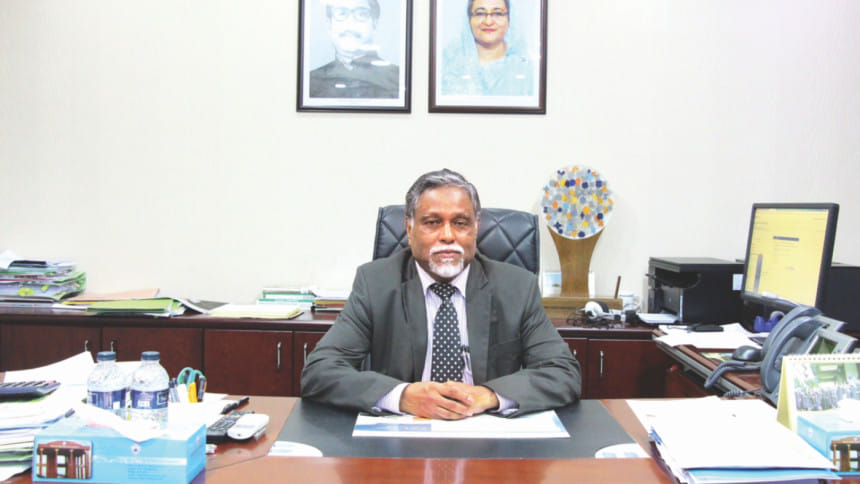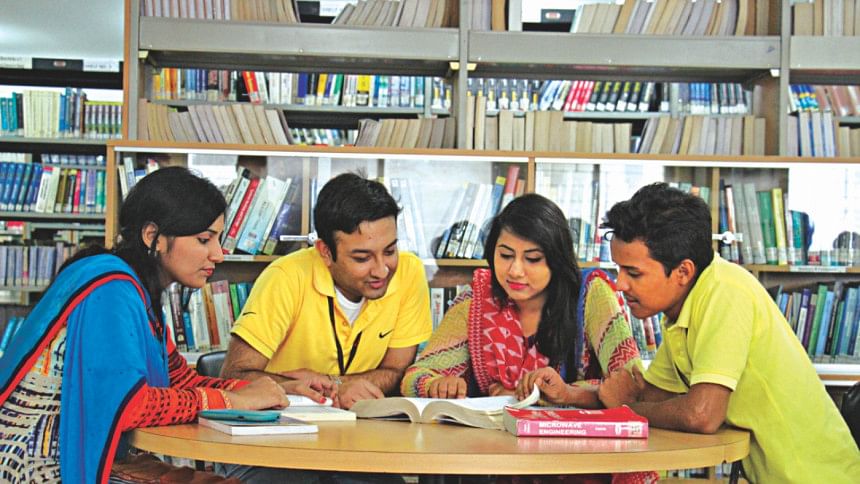Our goal should be producing world class graduates

North South University (NSU) recruits quality teachers. We haven't got a single lecturer who doesn't have a Masters degree; in fact, our first preference of education qualification is PhD. We do not have any academic staff from the level of Assistant Professor who doesn't have a PhD degree. We are very quality conscious. Our teaching method is always under review and we change this to improve the outcome. Our classrooms are small. About 30 to 35 students can sit in a classroom so as to ensure individual attention to each student.
NSU also has very demanding programmes. Our educational technology is the best in terms of classrooms, equipment, projectors, laptops, etc. We equip our teachers adequately and thus don't allow them to engage in part-time jobs outside of this university. In return, we pay them a good salary.
Our staff use updated and good quality textbooks. Most of these books are read in universities around the US, Europe, Australia, etc. Thus, one can say that we are in the same row as the best universities in the world. We also have exchange programme with other global universities, as we have students coming here from universities of the US, Europe, and Australia. This, unfortunately, was interrupted by the Gulshan incident. We could not host many students as their government stopped their travel to Bangladesh for security reasons.
We haven't got a training centre here but we have two things. I have been talking to officials of some Australian universities. Our teaching staff will do certificate courses on tertiary education from these universities. This is a four-unit course. In Australia, there are some universities that have made it compulsory for all university course. In fact, they have to pay for the courses. I am making a deal with Australian universities to make it cheaper for our teachers. Here we have some part-timers from many prominent universities. We plan to make training facilities for them.

We follow a philosophy while setting assignments, which follows a particular format, so that every teacher is familiar with it. We also plan to hire teachers from prominent universities of the world to train our staff.
Schools and colleges are the places that produce students for universities. With whatever input we get, we try to improve their quality, polish them. This ensures quality graduates who can enter the job market with ease. We don't have a single unemployed graduate; they all get jobs in their respective chosen careers, and that indicates our success. Some of our graduates are scientists enrolled in top universities of the world.
We are trying to accredit all our courses within the country and outside. Forming an accreditation council is a very good initiative. But like all other sectors, its success depends on what kinds of people are included, as well as the organisation culture. The success will depend on honesty, efficiency, and expertise. They need to have a clear demarcation line between their body and the UGC in terms of function and authority. Accreditation needs time as well. In many prominent universities, each course of every discipline is accredited in detail. But this requires a minimum of one year. They then analyse the outcome. They have particular standards for Masters and PhD programmes.
We have very good labs for every technical discipline. For some disciplines, there is no need for labs like reviewing literature. They, however, get adequate materials. In spite of that, research output is of low quality compared to other countries. In the Bangladeshi context, this might be fine. We can claim that we are the best private university in research like many others. But we are looking forward to achieving a place in world ranking. We want to be one of the top universities in Asia. Thus, we want to improve our research quality. We are emphasising on strong communication with other universities of the world to learn about their ideas on relevant issues. The best universities of the world have good quality teaching staff from all over the world. Although, the UGC chairman is quite against recruiting foreign lecturers, I think the sign of a good university is that they can attract foreign lecturers from abroad. We have good staff from abroad as well. We have to invest in them. For example, we hired a good researcher from Australia. We have to pay for bringing in his two pet horses from his hometown to Bangladesh. If we talk about globalisation, it basically means free flow of capital, professionals, cultures, students, and ideas.
We are very interested in launching PhD degrees but are not allowed to do that. We have all the capacity and facilities to launch these programmes. The problem of the approach by UGC is that they are binary – there are either private universities or public ones. Jagannath University can offer as many PhD degrees but private universities like North South or BRAC cannot. The case should not be public versus private; it should be about who has the capability. Thus, we are planning on offering joint degrees with foreign universities. The students will be supervised jointly but the award will be given by the foreign universities. We have to do it, we are being forced to do it.
Private universities should work together. If we do not work together, we will miss certain goals that we could have achieved together for the betterment of private university education as a whole.
Our teaching staff recruitment process is very rigorous. The applicant has to prove their skills at many levels. The selection committee is formed with skilled professors. Their assessment is important for recruitment. Finally, recruited staffs have to perform to continue in their position as well as for promotion.
At this moment, we have not been paying any tax because there is a court case going on in this regard. We are a non-profitable organisation. I don't understand the philosophy behind imposing taxes on private universities, as we only use our surplus fund in educational advancement.
NSU has 24 student clubs which engage in regular activities.
Islamic terrorism is a global problem nowadays, and it hinders our progress. After the Gulshan attack, bad publicity hampered our image. We have a number of teaching staff and 22,000 students. We should not be blamed for the activities of a few former students. We have taken many initiatives to ensure that our students don't engage in such subversive acts. We have expanded the students advisory and counseling department. We have enhanced our security system. We have formed an anti-terrorist committee as well. We provide a number of liberal arts courses for every discipline to create tolerance and solidarity among our students. Terrorism is a global and philosophical issue and thus, we have to face it globally and philosophically.

 For all latest news, follow The Daily Star's Google News channel.
For all latest news, follow The Daily Star's Google News channel. 



Comments